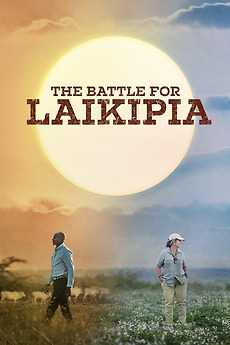When a severe drought strikes one of Kenya’s wildlife conservation havens, the ripple effect triggers uncomfortable discussions on colonialism, climate change and race.
By Jerry Chiemeke
The Battle for Laikipia is a feature documentary film co-directed by Greek filmmaker Daphne Matziaraki (whose 2016 short documentary 4.1 Miles earned an Oscar nomination for Best Documentary Short Subject) and award-winning Kenyan documentary director Peter Murimi (I Am Samuel, The Constant Gardener). Produced by Toni Kamau, filming takes place primarily in Laikipia and a few locations in Nairobi, Kenya’s capital city.
Laikipia, a county in Kenya known for its lush vegetation and diverse wildlife, is home to Samburu pastoralists (for whom the cattle are part of their culture and heritage) and white ranchers (whose ancestors acquired land during British colonial rule of Kenya). Both groups manage to peacefully co-exist in spite of ideological differences until a hard-hitting drought, which begins in 2017 and spans four years, leads to a strain on resources, and ultimately, damage to relations.
The Samburu, no strangers to migration and its accompanying nomadic lifestyle, need water for their dying livestock, but the owners of wildlife conservancies erect fences around their land, threatening violence for anyone who dares to venture in with their cattle. Neither side will budge, and as tensions mount, the need arises to interrogate a chequered history.
Matziaraki and Murimi rely on interviews and eyewitness accounts from pastoralists, ranchers, and political stakeholders in their search for answers. The discoveries are jarring, and the ugly truth behind the situation is captured by the deft edits of Sam Soko, inserting archival footage of pre-independence radio broadcasts, news reports, and old newspaper clippings. Both groups have valid claims to living on the land, but it is in the approach to enforcing said claim that we find a significant difference.
In one of the more brutal shots, one of the ranchers argues that “pastoralists have no need of possession because their life is their cattle, they walk around with their red blankets”, and in the very next cut, you find a few Samburu wailing in despair as they rummage through the debris of huts razed to the ground, looking for what to salvage, and discovering that one of their kinsmen is burnt alive. In another shot, two ranchers discussing over tea make condescending remarks about the pastoralists as the sound of gunfire echoes in the distance: hundreds of cattle are shot by security personnel on the pretext of protecting land from invasion.

With a runtime of 93 minutes, The Battle for Laikipia wades into uncomfortable territory, asking the hard questions. The colonial backdrop casts a grey shadow on the entire situation, but Matziaraki and Murimi also call out the Kenyan government for its slow response to pleas of intervention: parliamentarian Matthew Lempurkel is arrested on charges of incitement and hate speech when he dares to speak on the violence suffered by pastoralists.
The film goes on to examine the power of the media in shaping narratives: in many news reports (as captured by Soko’s edits), the Samburu are portrayed as violent, invasive savages. In more ways than one, the demonisation of the pastoralists is reminiscent of the portrayal of the African National Congress (ANC) in South Africa’s anti-apartheid struggle, and the Mau Mau who (at least early on) played a role in Kenya’s fight for independence. Anyone in search of further context can also take a look at Nigeria, where ethnic genocide perpetrated by Fulani herdsmen in the country’s Middle Belt region is reported as a “clash” in the news, and natives who dare to defend themselves are arrested by the corrupt Nigerian police.

A deeper dive into Kenya’s pre-colonial milieu would have elevated the work of Matziaraki and Murimi, but no one should accuse them of implicit bias or imbalance; they do not try to make saints of anyone, only doing their best to provide a more rounded perspective. The Battle for Laikipia unfurls a thick stain on Kenya’s political history, and in unsettling fashion, offers a window into the perils of climate change in the Global South.
One cut at the documentary’s 43-minute mark captures the overarching apprehension between both groups. A Samburu herder grazing his cattle is stopped by a rancher in an SUV. They exchange pleasantries tinged with sarcasm, and the rancher alludes to a curse afflicting the pastoralists. Both men smirk and part ways, but not before the rancher warns the Samburu to stay away from the ranch and boasts that army officers will round up all the cattle.
The Battle For Laikipia was an official selection of the World Cinema Documentary Competition section of the 2024 Sundance Film Festival, which was held from January 18 to 28, 2024.
The Sundance Film Festival, a programme of the nonprofit, Sundance Institute, is the pre-eminent gathering of original storytellers and audiences seeking new voices and fresh perspectives. Since 1985, hundreds of films launched at the Festival have gone on to gain critical acclaim and reach new audiences worldwide. The programme consists of fiction and nonfiction features and short films, series and episodic content, innovative storytelling, and performances, as well as conversations, and other events.
Jerry Chiemeke is a communications executive, film critic, journalist, and lawyer. His works have appeared in Die Welt, The i Paper, The Africa Report, Culture Custodian, and Statement Africa, among others. He has been selected for international film festivals like Berlinale, Durban International Film Festival, and Blackstar Film Festival in Philadelphia. Jerry lives in London, where he writes on Nollywood, African literature, and Nigerian music. He is the author of Dreaming of Ways to Understand You, a collection of short stories.




